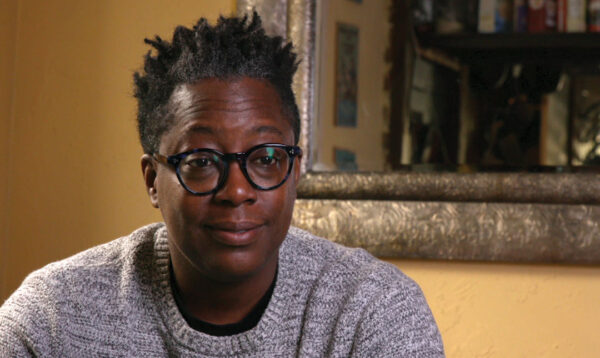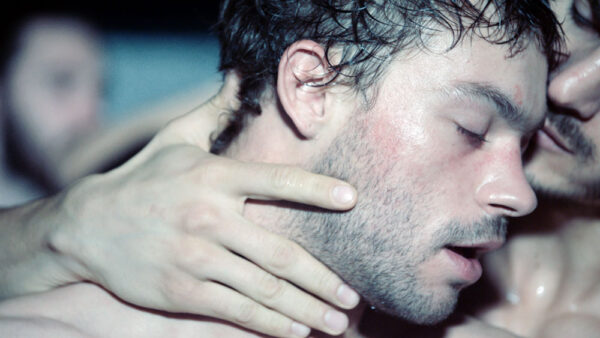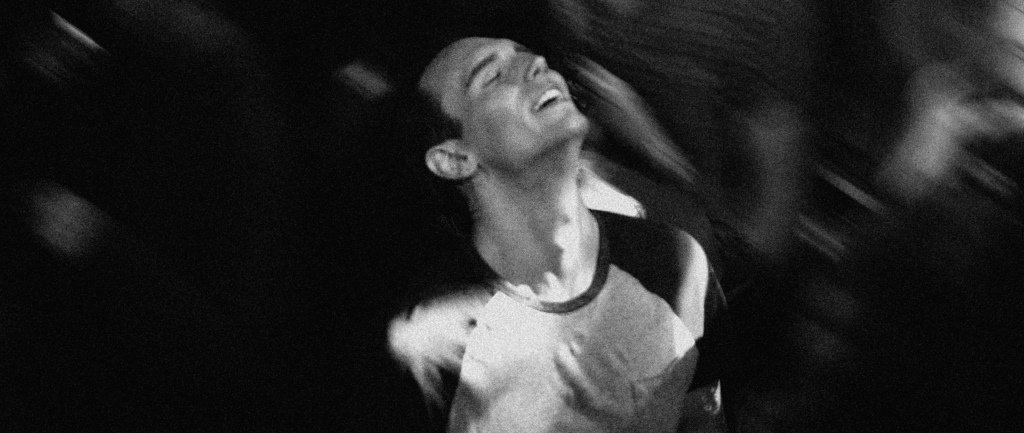“Taking for granted our liberties would be complacency on a grand scale…”
• “We must learn how to listen in this confusing and turbulent time for LGBT+ people”
• 13 feature films, 14 programmes of short films, talks, industry day, education day and a carnival to bring the 2018 film festival to a close
• AIDS – retelling the story for a new audience after almost 40 years since the world changed forever

“We must learn how to listen in this confusing and turbulent time for LGBT+ people” was one of the key messages conveyed by the organisers of the 2018 Iris Prize LGBT+ Film Festival as they announced the full programme for the annual Cardiff based extravaganza.
Berwyn Rowlands, Iris Prize Festival Director, commented:
“There are many threats to our freedoms and challenges to how we live our day to day lives. Taking for granted our liberties would be complacency on a grand scale; things change in the world very quickly as we have witnessed this year in the USA. As an LGBT+ community we also need to be able to talk and listen to each other. Social media is a powerful tool for communication, but it can funnel discussion into an echo chamber, where it is difficult to listen and understand each other.
“This is why we are committed to creating a safe space for discussion at Iris. We want our audience to enjoy the stories we have to share on the big screen. But we also believe that talking and listening is part of that experience. We are one community with many facets, and no one person has the same experience as another. As such, it is important to listen to voices and experiences different to our own, to embrace intersectionality as a way to enrich our lives and experiences as LGBT+ people, and especially as a way to fight back against these turbulent times.
“And there is much to talk about this year as we have our most ambitious programme to date.”
The 6-day festival of film includes 13 feature films and 14 programmes of short film with the £30,000 Iris Prize for best short the jewel in the crown, supported by the Michael Bishop Foundation.
Berwyn Rowlands, Iris Prize Festival Director, commented:
“Since it was first identified in 1981, the story of AIDS (and now HIV) has been one of remarkable progress. Advances in medicine have transformed it from a terminal condition to a chronic, long term one. Testing campaigns and preventative medicines are driving down the numbers of those getting HIV in countries that can afford it and know how to do it. But it was very different in the early days.
“As we near the crisis’s 40th anniversary, how do we share stories of that time? How do we honour those who lived through it, and remember those who didn’t?
“A number of films in this year’s programme (both narrative and documentary) take a look back at the early days of AIDS, and so we’re taking this opportunity to ask, what are the responsibilities that come with telling that story? When is it appropriate to return? Who is the audience? And do today’s filmmakers have anything new to say?”
The festival has the UK premiere of Yen Tan’s new film
1985 (pictured top). Shot in stark black and white, 1985 takes us back to the early days of the HIV/AIDS crisis. It features the story of Adrian (Gotham’s Cory Michael Smith) who returns from Manhattan to his conservative, Christian family in Texas, where he gets a warm welcome from his mother (Sideways star Virginia Madsen), but a frostier one from his father (The Shield’s Michael Chiklis).
Another festival highlight is Caroline Berler’s new documentary
Dykes, Camera, Action! which features many prominent lesbian film makers including former Iris Prize Jury Chair Cheryl Dune (pictured above). She is joined by an all start cast including Barbara Hammer, Su Friedrich, Rose Troche, Yoruba Richen, Desiree Akhavan, Vicky Du, film critic B. Ruby Rich, historian Jenni Olson, and others who share moving and often hilarious stories from their lives and discuss how they've expressed queer identity through film.
The film is followed by a talk discussing what lesbians and bi women are watching today, where and how they choose to watch it and the difficulties surrounding making films for this audience in a male-dominated film industry, and how the internet may be changing that."
The full list of 13 feature films are:
 Evening Shadows
Evening Shadows Dir: Sridhar Rangayan | India | 102min
Sauvage Dir: Camille Vidal-Naquet | France | 97min (pictured above)
Fairytale (Favola) Dir: Sebastiano Mauri | Italy | 87min
Just Friends (Gewoon Vrienden) Dir: Annemarie van de Mond | Netherlands | 80min
M/M Dir: Drew Lint | Canada/Germany | 81min
Postcards from London Dir: Steve McLean | UK | 88min (pictured above).
Eva + Candela (¿Cómo te llamas?) Dir: Ruth Caudeli | Colombia | 90min
Anchor and Hope (Tierra Firme) Dir: Carlos Marques-Marcet | Spain | 113min
1985 Dir: Yen Tan | USA | 85min
Cola de Mono Dir: Alberto Fuguet | Chile | 102min
A Moment in the Reeds Dir: Mikko Makela | Finland | 108min
Dykes, Camera, Action! Dir: Caroline Berler | USA | 58mins
Nina Dir: Olga Chajdas | Poland | 130min
All 13 feature films are contenders for the Iris Prize Best Feature Award which is sponsored for the first time by Cardiff based Bad Wolf. The performance awards for acting in a male and female role are sponsored by Attitude and Diva Magazines respectively.
The full programme is available
here:
TICKETS
Members priority booking opens on Wednesday 22 August and the public box office opens on Wednesday 5 September 2018.
 “We must learn how to listen in this confusing and turbulent time for LGBT+ people” was one of the key messages conveyed by the organisers of the 2018 Iris Prize LGBT+ Film Festival as they announced the full programme for the annual Cardiff based extravaganza.
Berwyn Rowlands, Iris Prize Festival Director, commented:
“There are many threats to our freedoms and challenges to how we live our day to day lives. Taking for granted our liberties would be complacency on a grand scale; things change in the world very quickly as we have witnessed this year in the USA. As an LGBT+ community we also need to be able to talk and listen to each other. Social media is a powerful tool for communication, but it can funnel discussion into an echo chamber, where it is difficult to listen and understand each other.
“This is why we are committed to creating a safe space for discussion at Iris. We want our audience to enjoy the stories we have to share on the big screen. But we also believe that talking and listening is part of that experience. We are one community with many facets, and no one person has the same experience as another. As such, it is important to listen to voices and experiences different to our own, to embrace intersectionality as a way to enrich our lives and experiences as LGBT+ people, and especially as a way to fight back against these turbulent times.
“And there is much to talk about this year as we have our most ambitious programme to date.”
The 6-day festival of film includes 13 feature films and 14 programmes of short film with the £30,000 Iris Prize for best short the jewel in the crown, supported by the Michael Bishop Foundation.
Berwyn Rowlands, Iris Prize Festival Director, commented:
“Since it was first identified in 1981, the story of AIDS (and now HIV) has been one of remarkable progress. Advances in medicine have transformed it from a terminal condition to a chronic, long term one. Testing campaigns and preventative medicines are driving down the numbers of those getting HIV in countries that can afford it and know how to do it. But it was very different in the early days.
“As we near the crisis’s 40th anniversary, how do we share stories of that time? How do we honour those who lived through it, and remember those who didn’t?
“A number of films in this year’s programme (both narrative and documentary) take a look back at the early days of AIDS, and so we’re taking this opportunity to ask, what are the responsibilities that come with telling that story? When is it appropriate to return? Who is the audience? And do today’s filmmakers have anything new to say?”
The festival has the UK premiere of Yen Tan’s new film 1985 (pictured top). Shot in stark black and white, 1985 takes us back to the early days of the HIV/AIDS crisis. It features the story of Adrian (Gotham’s Cory Michael Smith) who returns from Manhattan to his conservative, Christian family in Texas, where he gets a warm welcome from his mother (Sideways star Virginia Madsen), but a frostier one from his father (The Shield’s Michael Chiklis).
Another festival highlight is Caroline Berler’s new documentary Dykes, Camera, Action! which features many prominent lesbian film makers including former Iris Prize Jury Chair Cheryl Dune (pictured above). She is joined by an all start cast including Barbara Hammer, Su Friedrich, Rose Troche, Yoruba Richen, Desiree Akhavan, Vicky Du, film critic B. Ruby Rich, historian Jenni Olson, and others who share moving and often hilarious stories from their lives and discuss how they've expressed queer identity through film.
The film is followed by a talk discussing what lesbians and bi women are watching today, where and how they choose to watch it and the difficulties surrounding making films for this audience in a male-dominated film industry, and how the internet may be changing that."
The full list of 13 feature films are:
“We must learn how to listen in this confusing and turbulent time for LGBT+ people” was one of the key messages conveyed by the organisers of the 2018 Iris Prize LGBT+ Film Festival as they announced the full programme for the annual Cardiff based extravaganza.
Berwyn Rowlands, Iris Prize Festival Director, commented:
“There are many threats to our freedoms and challenges to how we live our day to day lives. Taking for granted our liberties would be complacency on a grand scale; things change in the world very quickly as we have witnessed this year in the USA. As an LGBT+ community we also need to be able to talk and listen to each other. Social media is a powerful tool for communication, but it can funnel discussion into an echo chamber, where it is difficult to listen and understand each other.
“This is why we are committed to creating a safe space for discussion at Iris. We want our audience to enjoy the stories we have to share on the big screen. But we also believe that talking and listening is part of that experience. We are one community with many facets, and no one person has the same experience as another. As such, it is important to listen to voices and experiences different to our own, to embrace intersectionality as a way to enrich our lives and experiences as LGBT+ people, and especially as a way to fight back against these turbulent times.
“And there is much to talk about this year as we have our most ambitious programme to date.”
The 6-day festival of film includes 13 feature films and 14 programmes of short film with the £30,000 Iris Prize for best short the jewel in the crown, supported by the Michael Bishop Foundation.
Berwyn Rowlands, Iris Prize Festival Director, commented:
“Since it was first identified in 1981, the story of AIDS (and now HIV) has been one of remarkable progress. Advances in medicine have transformed it from a terminal condition to a chronic, long term one. Testing campaigns and preventative medicines are driving down the numbers of those getting HIV in countries that can afford it and know how to do it. But it was very different in the early days.
“As we near the crisis’s 40th anniversary, how do we share stories of that time? How do we honour those who lived through it, and remember those who didn’t?
“A number of films in this year’s programme (both narrative and documentary) take a look back at the early days of AIDS, and so we’re taking this opportunity to ask, what are the responsibilities that come with telling that story? When is it appropriate to return? Who is the audience? And do today’s filmmakers have anything new to say?”
The festival has the UK premiere of Yen Tan’s new film 1985 (pictured top). Shot in stark black and white, 1985 takes us back to the early days of the HIV/AIDS crisis. It features the story of Adrian (Gotham’s Cory Michael Smith) who returns from Manhattan to his conservative, Christian family in Texas, where he gets a warm welcome from his mother (Sideways star Virginia Madsen), but a frostier one from his father (The Shield’s Michael Chiklis).
Another festival highlight is Caroline Berler’s new documentary Dykes, Camera, Action! which features many prominent lesbian film makers including former Iris Prize Jury Chair Cheryl Dune (pictured above). She is joined by an all start cast including Barbara Hammer, Su Friedrich, Rose Troche, Yoruba Richen, Desiree Akhavan, Vicky Du, film critic B. Ruby Rich, historian Jenni Olson, and others who share moving and often hilarious stories from their lives and discuss how they've expressed queer identity through film.
The film is followed by a talk discussing what lesbians and bi women are watching today, where and how they choose to watch it and the difficulties surrounding making films for this audience in a male-dominated film industry, and how the internet may be changing that."
The full list of 13 feature films are:
 Evening Shadows Dir: Sridhar Rangayan | India | 102min
Sauvage Dir: Camille Vidal-Naquet | France | 97min (pictured above)
Fairytale (Favola) Dir: Sebastiano Mauri | Italy | 87min
Just Friends (Gewoon Vrienden) Dir: Annemarie van de Mond | Netherlands | 80min
M/M Dir: Drew Lint | Canada/Germany | 81min
Postcards from London Dir: Steve McLean | UK | 88min (pictured above).
Eva + Candela (¿Cómo te llamas?) Dir: Ruth Caudeli | Colombia | 90min
Anchor and Hope (Tierra Firme) Dir: Carlos Marques-Marcet | Spain | 113min
1985 Dir: Yen Tan | USA | 85min
Cola de Mono Dir: Alberto Fuguet | Chile | 102min
A Moment in the Reeds Dir: Mikko Makela | Finland | 108min
Dykes, Camera, Action! Dir: Caroline Berler | USA | 58mins
Nina Dir: Olga Chajdas | Poland | 130min
All 13 feature films are contenders for the Iris Prize Best Feature Award which is sponsored for the first time by Cardiff based Bad Wolf. The performance awards for acting in a male and female role are sponsored by Attitude and Diva Magazines respectively.
The full programme is available here:
TICKETS
Members priority booking opens on Wednesday 22 August and the public box office opens on Wednesday 5 September 2018.
Evening Shadows Dir: Sridhar Rangayan | India | 102min
Sauvage Dir: Camille Vidal-Naquet | France | 97min (pictured above)
Fairytale (Favola) Dir: Sebastiano Mauri | Italy | 87min
Just Friends (Gewoon Vrienden) Dir: Annemarie van de Mond | Netherlands | 80min
M/M Dir: Drew Lint | Canada/Germany | 81min
Postcards from London Dir: Steve McLean | UK | 88min (pictured above).
Eva + Candela (¿Cómo te llamas?) Dir: Ruth Caudeli | Colombia | 90min
Anchor and Hope (Tierra Firme) Dir: Carlos Marques-Marcet | Spain | 113min
1985 Dir: Yen Tan | USA | 85min
Cola de Mono Dir: Alberto Fuguet | Chile | 102min
A Moment in the Reeds Dir: Mikko Makela | Finland | 108min
Dykes, Camera, Action! Dir: Caroline Berler | USA | 58mins
Nina Dir: Olga Chajdas | Poland | 130min
All 13 feature films are contenders for the Iris Prize Best Feature Award which is sponsored for the first time by Cardiff based Bad Wolf. The performance awards for acting in a male and female role are sponsored by Attitude and Diva Magazines respectively.
The full programme is available here:
TICKETS
Members priority booking opens on Wednesday 22 August and the public box office opens on Wednesday 5 September 2018. 
